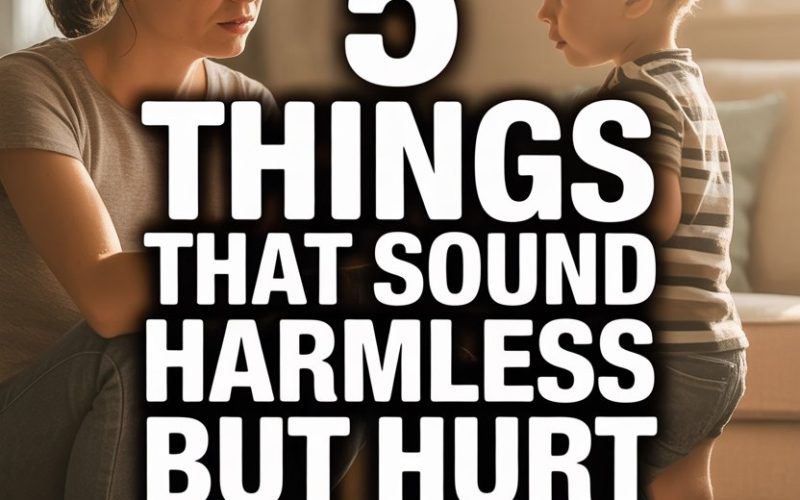Parenting often feels like wading through a minefield in slippers, hoping for the best and praying that the baby wipes are nearby.
Most mums and dads want nothing more than happy, healthy offspring who’ll eventually appreciate at least half their efforts.
Yet, some of the things that seem the most innocent can leave a mark—sometimes for years to come.
Here are five well-meaning habits that, surprisingly, can sting more than you’d expect.
1. Saying “You’re So Smart!”
It slips out so easily, doesn’t it?
Your child brings home a shiny sticker or manages to spell ‘triceratops’ (that one’s for the dinosaur-obsessed), and the first thing out of your mouth is, “You’re so smart!” Seems like a lovely boost for their confidence.
But here’s the catch: lavishing praise on intelligence can actually make kids more anxious about failure.
Carol Dweck, a psychologist at Stanford, found that children praised for being smart started avoiding challenges and gave up more quickly when things got tough.
Praising effort—“You worked really hard on that!”—helps kids develop grit and a love of learning. They begin to see mistakes as part of the journey, not proof they aren’t ‘smart enough.’
Next time your child solves a tricky puzzle or writes an epic poem about underpants, try focusing on what they did rather than what they are. It might be the difference between a child who tries, and one who’s afraid to try at all.
2. Forcing “Polite” Hugs or Kisses
Every family gathering comes with the same soundtrack: “Go on, give Nana a kiss!” or “You have to hug Uncle Geoff goodbye.”
Hug quotas seem innocent enough, but kids hear something else: “What you want with your body doesn’t matter.”
Teaching children to ignore their own discomfort for the sake of adult feelings can blur the lines of consent and personal boundaries down the track.
Child protection experts have long warned about the importance of body autonomy, even for the smallest kids. When we teach them they can say “no” to physical affection—even with relatives—they learn their bodies are their own.
If you’re worried about Granny’s feelings, offer alternatives: a high-five, a wave, a drawing of an octopus. Granny will survive.
Boundary-setting skills, on the other hand, are priceless.
3. Keeping Secrets About “Grown-Up Stuff”
The temptation to sweep things under the rug is fierce. Maybe there’s a family illness, a job loss, or something even heavier.
The logic goes: shield the kids and they’ll be fine. After all, what they don’t know can’t hurt them.
Except, little ones have antennae sharper than any MI6 operative. They notice when you whisper, or when adults suddenly swap nervous glances.
Not knowing the truth can make children anxious, and their imaginations tend to fill in the blanks—often with something much scarier than reality.
Research published by the Child Mind Institute shows that kids handle tough topics better when adults use honest, age-appropriate language.
That doesn’t mean laying out the full tax return or the gory details of Auntie’s operation. It does mean reassuring them (“Mum is sad right now, but we’re getting help and we’ll be okay”) instead of leaving them to invent their own explanations.
Your child’s question might catch you off guard, but a little honesty goes a long way.
4. Dismissing Big Feelings With “You’re Okay!”
Little knees hit the pavement, the tears start, and there it is: “You’re okay! Up you get!” Maybe you’re late for work. Maybe you just can’t face another meltdown.
But telling kids they’re fine when they’re clearly not doesn’t make the pain go away—it just teaches them not to trust their own emotions.
Clinical psychologists, including Dr. Laura Markham, stress that emotional validation is the foundation of resilience. Instead of a quick “You’re fine,” try “That looks like it really hurt!” or “You seem sad about your tower falling down.”
When kids feel their feelings are acknowledged, they’re more likely to bounce back, not bottle things up.
Besides, anyone who’s stepped on a rogue LEGO knows pain is nothing to sneeze at.
5. Over-Scheduling Every Spare Minute
There’s a certain pride in having a calendar that looks like air-traffic control at Heathrow. Ballet, footy, coding camp, Mandarin, birthday parties… a child’s week can fill up faster than you can say ‘where did my Saturday go?’
Structured activities do have their perks (not least, someone else entertaining your child for an hour). But the real magic often happens in the margins: when kids are bored, mucking about, or making up games with sticks and laundry baskets.
Unstructured play boosts creativity, self-regulation, and problem-solving skills, according to the American Academy of Pediatrics.
If your little one’s only downtime happens in the car between violin and karate, it might be time to drop an activity or two. A little boredom now and then is the birthplace of big ideas.
Why the Little Things Add Up
Most parents are just trying to do their best—juggling groceries, meetings, and probably some sort of suspiciously sticky situation under the couch.
No one gets it perfect, and most kids are more resilient than we give them credit for.
Still, the choices made in everyday moments shape the adults our children become. Swapping “You’re so smart!” for “That took a lot of effort!” or saving Nana from a reluctant peck might feel minor.
Yet, these tiny tweaks grow into stronger, more confident kids who know their worth and trust their instincts.
And that’s about as close as you’ll get to winning at parenting. Until the next curveball, anyway.





